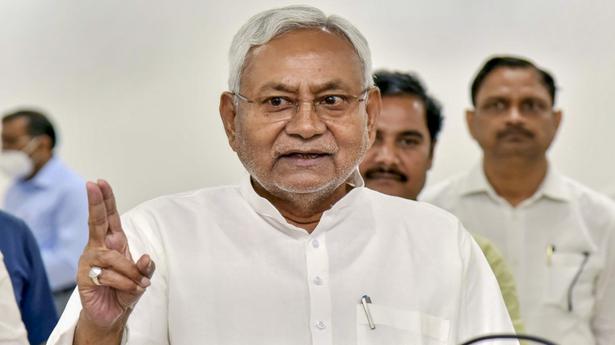
Why Nitish Kumar is counting on a caste count in Bihar
The Hindu
His electoral stock vis-a-vis the BJP is dwindling — the enumeration exercise could help him recover political capital
Bihar Chief Minister Nitish Kumar has, of late, been holding his political cards close to his chest, revealing them at moments of his own choosing and resisting the urgency of public debates and events — whether it be in the run-up to the announcement of the presidential candidate of the National Democratic Alliance, of which his Janata Dal (United) is a constituent, or on the Agnipath scheme for recruitment to the armed forces. What he has taken up most emphatically and unambiguously, however, is the demand for a caste-based census.
Also read: Explainer | The Bihar government’s caste-count
On June 1, after chairing an all-party meeting in Patna, he announced that Bihar would begin a caste-based census. The case for a caste-based census has been often made. But now Mr. Kumar’s push for the census brings into focus the reluctance of the Bharatiya Janata Party (BJP), which leads the NDA, on the issue, as well as the timing of the demand.
The census conducted at the beginning of every decade does not record any caste data other than for those listed as Scheduled Castes. In August 1990, the V.P. Singh government announced the decision to implement the Mandal Commission report, extending reservation to castes grouped together as the Other Backward Classes (OBCs). The last census to record caste was conducted in 1931, and the Mandal panel’s determination that OBCs accounted for 52% of the population drew heavily from that. It was not clear then, nor is it now, whether this 52% was up-to-date. Is it more, or is it less? Are only a few castes among the OBCs cornering the benefits of reservation? Only a caste-based census can answer these questions.
This is the argument deployed by Mr. Kumar and other Opposition parties, including his key political rival in Bihar, the Rashtriya Janata Dal.
The June 1 announcement did not come out of the blue. The Bihar Assembly had unanimously passed a resolution seeking a caste-based census in February 2019, and then another one exactly a year later. It is a historically longstanding demand that consecutive governments in Delhi have sought to ignore. So far, a few State governments have carried out such exercises on their own.
In July 2021, the JD(U) once again stepped up pressure on the Centre by passing a resolution at its National Executive meeting held in Delhi that a delegation of its MPs would meet Prime Minister Narendra Modi to press for a caste-based census. The Prime Minister did not entertain the delegation. But they met Home Minister Amit Shah. Then Mr. Kumar decided to step in himself. In August last year, he led a delegation of 10 parties to meet the Prime Minister in Delhi













